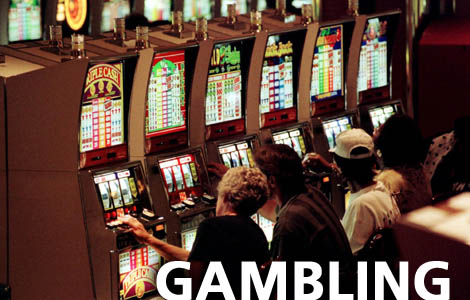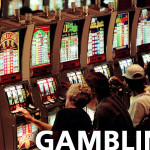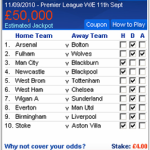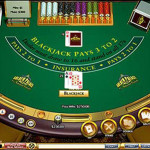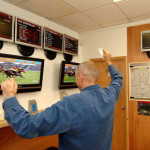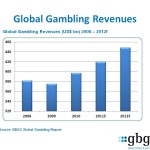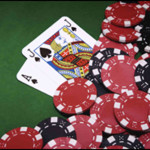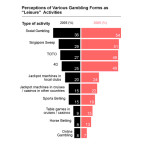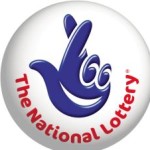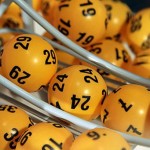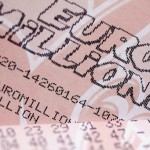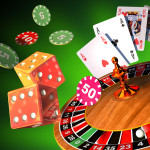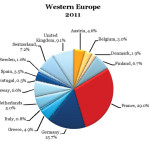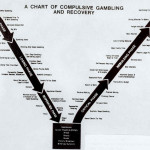I’ve written before about gambling and betting (see here), but feel the subject deserves more attention, starting here: Gambling definition courtesy of Wikipedia:
Gambling is the wagering of money or something of material value (referred to as “the stakes”) on an event with an uncertain outcome with the primary intent of winning additional money and/or material goods. Gambling thus requires three elements be present: consideration, chance and prize. Typically, the outcome of the wager is evident within a short period.
The term gaming in this context typically refers to instances in which the activity has been specifically permitted by law. The two words are not mutually exclusive; i.e., a “gaming” company offers (legal) “gambling” activities to the public and may be regulated by one of many gaming control boards, for example, the Nevada Gaming Control Board. However, this distinction is not universally observed in the English-speaking world. For instance, in the UK, the regulator of gambling activities is called the Gambling Commission (not the Gaming Commission). Also, the word gaming is frequently used to describe activities that do not involve wagering, especially online.
This is distinct from the sort of professional gambling associated with, for example, “rogue traders” who have in some cases lost huge sums without any personal gain other than the desire for status and bonuses (see here and here.) No, for these purposes I’m talking about gambling as a leisure time activity.
Why do people do it? Because it’s exciting, to the extent that you might lose 10 times in a row, but if you win something on the 11th turn that more than makes up for your previous losses – emotionally, if not financially. Risk is something we all take, to a greater or lesser degree. I remember getting excited while bidding for furniture at an auction, a not dissimilar sensation, but I am not a real gambler.
Gambling as a leisure pursuit is huge business, even in the UK, dwarfed as we are by the American market. The British gambling industry is apparently worth £5.8 billion gross a year, according to the 2012 figures published by the Gambling Commission, up £0.2b from the previous year. Of this lotteries accounted for £227.8m or 4% of the total, compared to betting in person (horses, dogs etc.) which amounted to 52% plus 12% “remote”, 15% in casinos, 11% on bingo and 6% on arcades. This is also without the private wagers held between the super-rich and even the not-so-rich, all of which are conducted behind closed doors.
I’ll make my position clear from the start. My question is whether it is a good idea to expand gambling in any form, and since I believe it is already out of hand then reducing its influence can only benefit British society. While I recognise that gambling gives a lot of pleasure to a lot of people, I don’t approve of it at all. I have several reasons for this opinion, which I know many will violently oppose:
- Gambling and gaming is, at least for a proportion of the population, addictive and harmful. Like alcohol and drugs, it can destroy families (see the stages of addiction further down.)
- It distorts and corrupts sports away from the idea of playing to win in favour of being all about money. The same might equally be said of football these days as much as horse and greyhound racing, but those and other sports are purely about the betting.
- The odds are always stacked against the gambler – you can’t win in the long run. Gambling gives false hope to people who can ill afford to lose the money they give to the lottery or whatever other form of gambling they choose.
- A proportion of gambling will be corrupt and criminal, attracted by the huge profits available. Gambling feeds organised crime to the detriment of society. We are the victims and no matter how many illegal gambling syndicates are uncovered by police anywhere in the world, many more continue to fleece the punters and use the money to fund other criminal activity.
- Gambling is a negative and wasteful form of human endeavour. There are so many more constructive and creative things we could and should be doing with our time than frittering away money on games of chance. Innovation can fuel growth in the economy, gambling can’t.
- Casinos, arcades, betting shops drag down towns and cities everywhere they are located. They look and are tacky, and attract the sort of people and other businesses you would not want in a warm, friendly environment.
- Gambling sends entirely the wrong message to our children about how they and we should behave.
Politicians like gambling because of the tax income generated and at the last count nearly 110,000 jobs (though this is 15,000 down from 2008 data.) You may recall our previous government had a plan, which it eventually withdrew, to open a number of licensed “super-casinos” (like this one) – virtually a plan to turn our country into a number of minor Las Vegas wannabes. If you’ve ever been to Vegas or Reno, you will know exactly what I mean. In the case of Vegas, there was never a soul to be sold, but if you can imagine London or Manchester or Newcastle or Swansea or any other city over here becoming swamped by gambling culture you would not be happy.
I’m not suggesting for a moment that every form of gambling should be declared illegal, and neither am I that naive as to think you can stop people betting on who will win whatever contest is being held: for better or worse, it is human nature to bet on the outcome of anything. But I do think it should be taxed more highly than it is, and many more restrictions placed on the availability of betting, especially now online gambling which bypasses UK laws and taxes and which are advertised on TV and online almost constantly.
The breadth of gambling methods, which at one time seldom went beyond the football pools, horse racing, dog racing, slot machines and the occasional game of poker, have exploded out of all recognition, and have become steadily harder to understand or predict. Playing the stock market was always subject to ups and downs, but techniques like options and spread betting are now working their way through the system. You can not only bet on the result of a football match but who will score, what time they will score, and the variances of current match score at different stages of the game, just as they could pick various accumulators in horse racing. The less people understand what they are doing, the greater the likelihood they will pick a method with odds stacked against them and therefore the higher the probability they will lose.
The national lottery (including the main games and scratch cards) has become an institution, attracts people by virtue of money going to “good causes” (though arguably some have been less than effective ways to spend the money), but the odds against a win are so vast you would only ever do so as a dream, not out of any realistic hopes of winning. Don’t believe me? This might persuade you otherwise.
- 6 Numbers (Typical prize: £2 million)
6 numbers are drawn at random from the set of integers between 1 and 49, which means there are 49!/(6!*(49-6)!) combinations of numbers (the draw order doesn’t matter). The means that the jackpot chance is 1 in 13,983,816 or approximately 1 in 14 million.- 5 Numbers + Bonus Number (Typical prize: £100,000)
You are still matching 6 numbers from the 1 to 49 set as above, but you can now do it in 6 different ways (by dropping each of the main numbers in turn), therefore the chance is 1 in 13,983,816/6, which works out as 1 in 2,330,636.- 5 Numbers (Typical prize: £1,500)
This is 42 times more likely than getting 5 numbers + the bonus number because, after the first six balls are drawn, there are 43 balls left and you can match 42 of these 43 balls without matching the bonus number. Therefore the chance is 1 in 2,330,636/42, which evaluates to 1 in 55,491.33333.- 4 Numbers (Typical prize: £65)
Firstly, let’s take the case of the first 4 of your numbers matching and the last 2 not matching. In this single case (where each set of chances relies on the previous event occurring):Chance that your 1st number matches a winning number is 1 in 49/6.
Chance that your 2nd number matches a winning number is 1 in 48/5.
Chance that your 3rd number matches a winning number is 1 in 47/4.
Chance that your 4th number matches a winning number is 1 in 46/3.
Chance that your 5th number doesn’t match a winning number is 1 in 45/(45-2) [because there are still 2 unmatched winning numbers].
Chance that your 6th number doesn’t match a winning number is 1 in 44/(44-2) [yes, still 2 unmatched winning numbers].Now you need to accumulate all those chances by multiplying them together:
1 in (49/6)*(48/5)*(47/4)*(46/3)*(45/43)*(44/42) which is 1 in 15486.953. Now this is the chance for that single case occurring, but there are 15 combinations of matching 4 from 6 [6!/(4!*(6-4)!)], so you divide the answer by 15 to get 1 in 15486.953/15 or 1 in 1032.4.- 3 Numbers (Constant prize: £10)
Follow exactly the same scheme as the 4 match above to get these figures:
1 in (49/6)*(48/5)*(47/4)*(46/43)*(45/42)*(44/41) (which is 1 in 1133.119) for a single case. There are 20 combinations of 3 from 6 [6!/(3!*(6-3)!], so the chance of a 3 match is 1 in 1133.119/20 or 1 in 56.7.The chance of you winning any of the above prizes is approximately 54 to 1 – it is reckoned an average of one million people per draw will win a prize.
Using some computer software I wrote, I calculated how many prizes would be won if all combinations of the 13,983,816 tickets were bought:
Category Prizes Chances Jackpot 1 1 in 13,983,816 5+bonus 6 1 in 2,330,636 5-match 252 1 in 55,491.33 4-match 13,545 1 in 1,032.40 3-match 246,820 1 in 56.66
Total 260,624 1 in 53.66Needless to say, this exactly tallies with the more theoretical version that I described above.
If you were being rational rather than emotional, there are far better, if more boring ways to invest your money and earn a return, but with gambling the appeal is always emotional – until you are totally hooked and can’t back out. The issues with problem gambling may only affect a comparatively small number at the most severe levels, but can creep up on a vastly higher number without their ever joining the official statistics. Even at the early stages the effects can be devastating. If we are being honest, we may all recognise someone we know and maybe love somewhere in the grip of an gambling addiction:
- Preoccupation. The subject has frequent thoughts about gambling experiences, whether past, future, or fantasy.
- Tolerance. As with drug tolerance, the subject requires larger or more frequent wagers to experience the same “rush”.
- Withdrawal. Restlessness or irritability associated with attempts to cease or reduce gambling.
- Escape. The subject gambles to improve mood or escape problems.
- Chasing. The subject tries to win back gambling losses with more gambling.
- Lying. The subject tries to hide the extent of his or her gambling by lying to family, friends, or therapists.
- Loss of control. The person has unsuccessfully attempted to reduce gambling.
- Illegal acts. The person has broken the law in order to obtain gambling money or recover gambling losses. This may include acts of theft, embezzlement, fraud, or forgery.
- Risked significant relationship. The person gambles despite risking or losing a relationship, job, or other significant opportunity.
- Bailout. The person turns to family, friends, or another third party for financial assistance as a result of gambling.
Of course there is help and support, such as Gambler’s Anonymous, but as with alcoholism weaning off is incredibly hard. The first stage of cure are to recognise you have a problem, so GA’s site offers help to people to admit to themselves they do need to act (see here and here.)
Given the level of harm it does, not just at the tip of the iceberg but as a malicious influence throughout society, I’d question whether any form of gambling or betting should be encouraged in any way. But then, it seems we are well behind continental countries in our attitudes to gambling. In one of the tables above, you will notice that France statistically spends over twice as much on gambling as the UK. Is French society richer and healthier for that? I severely doubt it!
If you are into the occasional punt on the gee gees, or buying a lottery ticket or two, I doubt if I will have changed your mind. But if I’ve made you think, this blog has been worthwhile.

